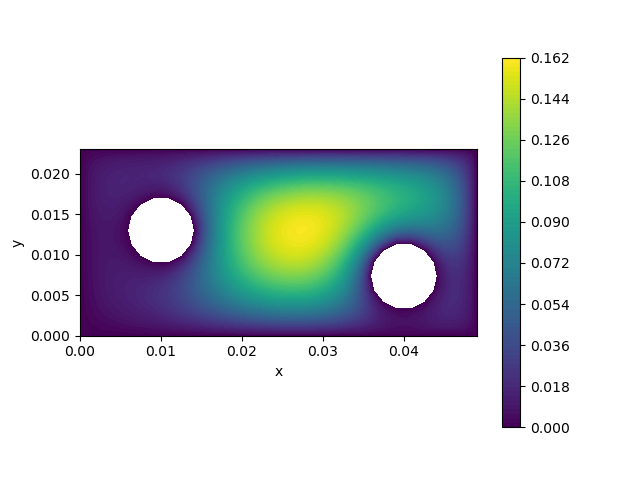| Documentation |
|---|
 |
AdFem is a finite element method open source library for inverse modeling in computational and mathematical engineering. It provides a set of reusable, flexible, and differentiable operators for building scalable and efficient simulators for partial differential equations.
AdFem is built on ADCME, an automatic differentiation library for computational and mathematical engineering. It was originally developed for prototyping inverse modeling algorithms using structured meshes but later evolved into a general and powerful tool with a scalable FEM backend MFEM.
Ad in AdFem stands for "automatic differentiation" or "adjoint".
Install Guide
using Pkg
Pkg.add("AdFem")Forward Computation in AdFem
As an example, we consider solving the Poisson's equation in AdFem
Here
The weak form for the Poisson's equation is to solve a variational equation
The problem is easily translated in AdFem:
using AdFem
using PyPlot
# forward computation
mmesh = Mesh(joinpath(PDATA, "twoholes_large.stl"))
xy = gauss_nodes(mmesh)
κ = @. sin(xy[:,1]) * (1+xy[:,2]^2) + 1.0
f = 1e5 * @. xy[:,1] + xy[:,2]
K = compute_fem_laplace_matrix1(κ, mmesh)
F = compute_fem_source_term1(f, mmesh)
bdnode = bcnode(mmesh)
K, F = impose_Dirichlet_boundary_conditions(K, F, bdnode, zeros(length(bdnode)))
sol = K\FThe above code shows how to use a linear finite element space to approximate the state variable on a given mesh, define boundary conditions, and construct the linear system.
Inverse Modeling
Most functions of AdFem, such as compute_fem_laplace_matrix1, compute_fem_source_term1, and impose_Dirichlet_boundary_conditions, are AD-capable, meaning that you can back-propagate gradients from their outputs to inputs. This enables you to conduct inverse modeling without writing extra substantial effort once the forward computation codes are implemented. AdFem constructs a static computational graph for finite element simulators: the computational graph is optimized before executation, and all computations are delegated to efficient C++ kernels.
Here we use a deep neural network to approximate κ(x) (fc is an ADCME function and stands for fully-connected):
nn_κ = squeeze(fc(xy, [20,20,20,1])) + 1
K = compute_fem_laplace_matrix1(nn_κ, mmesh)
F = compute_fem_source_term1(f, mmesh)
bdnode = bcnode(mmesh)
K, F = impose_Dirichlet_boundary_conditions(K, F, bdnode, zeros(length(bdnode)))
nn_sol = K\F
loss = sum((nn_sol - sol)^2)
sess = Session(); init(sess)
BFGS!(sess, loss)Installation
AdFem is tested on Unix platform (Linux and Mac). To install the stable release:
using Pkg
Pkg.add("ADCME") # dependency
Pkg.add("AdFem")To install the latest version:
using Pkg
Pkg.add(PackageSpec(url="https://github.com/kailaix/AdFem.jl", rev="master")) To install with docker, here is the built docker image provided by @Ricahrd-Li, and please see docker install guide.
Research
AdFem is an open-source package that accompanies ADCME.jl for solving inverse problems involving partial differential equations (PDEs). AdFem provides users a rich collection of operators, which users can use to quickly build finite element/volumn codes for forward computation. More importantly, these operators can back-propagate gradients, and therefore users can calculate the gradients using the ideas of adjoint methods and reverse-mode automatic differention (these two concepts overlap). The advanced physics constrained learning (PCL) approach enables users to back-propagate gradients through iterative and nonlinear solvers efficiently. AdFem offers a flexible interface for experienced researchers to develop their own operators.
Some related research works can be found here:
- Physics constrained learning for data-driven inverse modeling from sparse observations
- Solving Inverse Problems in Steady State Navier-Stokes Equations using Deep Neural Networks
- Inverse Modeling of Viscoelasticity Materials using Physics Constrained Learning
License
AdFem is licensed under MIT License. See LICENSE for details.



